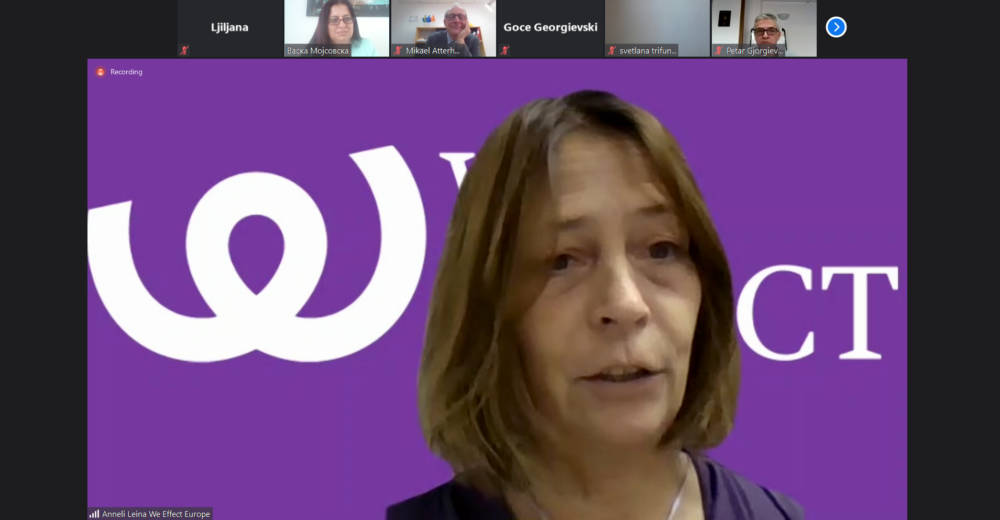Gender equality is crucial for food security
Date
October 27, 2021
Anneli Leina, Regional Director of We Effect Europe during her opening speech at the online event - Economic Empowerment of Rural Women in the Context of Sustainable Food Security System, organised by our partner organisations in North Macedonia.
“Gender equality is crucial for food security because investing in rural women improves the livelihood odds not just for women, but for everyone. When rural women are able to earn and control their income, this has a direct impact not only on the well-being and food security of their families, but it also brings lasting benefits to the entire community. Therefore, achieving sustainable agricultural development and food security would be impossible without empowering rural women,” said Anneli Leina, Regional Director of We Effect Europe in her opening speech at the online event – Economic Empowerment of Rural Women in the Context of Sustainable Food Security System, organised by our partner organisations in North Macedonia, NFF and RDN.
The event brought together various stakeholders from the rural areas of North Macedonia as well as representatives of institutions, SCOs and important actors in rural development to discuss the role of rural women in food systems, the challenges they face and actions to be taken in order to strengthen their position in the community.
“Women’s work in agriculture is essential for poverty reduction, food security and rural growth,” said Mikael Atterhög, Head of Development Cooperation at the Embassy of Sweden in North Macedonia, adding that “gender mainstreaming in rural sector policies is key for achieving women’s economic empowerment.”
“Agricultural policies and programmes should challenge existing inequalities. Sweden believes that women’s limited economic empowerment contributes to inequality between women and men and therefore is a priority of the Swedish development cooperation. For us, women’s economic empowerment implies that women have obtained real power over the economic decisions that influence their lives and priorities,” he said.
Goce Georgievski, Head of the Sector for Rural Development at the Ministry of Agriculture, Forestry and Water Economy of North Macedonia, acknowledged the obstacle that rural women face, saying that the Ministry is putting more efforts towards gender mainstreaming in policies and gender responsive budgeting.
As a positive example he mentioned the measure, commonly known as Measure 115, which envisages that rural women can have access to state grants in the amount of EUR 3000 (SEK30000) for direct investments in agriculture activities. The measure was adopted as a result of intensive lobby activities of our partner organisations in the country.
“We are seeing that this measure adopted in 2019 is already giving results. Until 2019 we had 36 048 women registered as active participants in agricultural activities, while now that number has risen to 38 241,” said Goce Georgievski unveiling plans at the Ministry to increase the support for the rural women through this measure both in terms of greater number of recipients and the amount of the grant.
In this context, Vaska Mojsovska, President of the National Federation of Farmers (NFF), said that “it is necessary to present good practices and positive examples of women entrepreneurs from the rural areas. But equally important is to create and promote measures to increase the employment opportunities for the rural women, development of their businesses and creating measures for recognising the unpaid care and farm work of the women living in the rural areas.”
Improving the economic opportunities for the rural women, reducing the burden of unpaid care and farm work on women and land ownership are key for opening up the full development potential of the rural areas.
“We know that in the Republic of North Macedonia there are benefits for the rural women who apply for the existing measures for support of agriculture and rural development through the national Rural Development Programme and IPARD, but I think it’s necessary to increase the incentive for the women entrepreneurs and to support the women who would realize these projects, by providing more information, encouragement, offering business ideas and securing business connections through various types of networking,” said the President of the Rural Development Network (RDN), Petar Gjorgievski.
In addition, at the event, positive experiences and activities were presented by the SCO sector to encourage taking concrete steps in the direction of economic empowerment of the women in the rural areas.
Biljana Petrovska Mitrevska, Project Manager at NFF, had a presentation on the topic Better Access to Markets – Challenge for the Women from the Rural Areas, while Liljana Jonoski from RDN talked about the ways of improving the social and economic position of the women in the rural areas.
The event stimulated fruitful discussion among the participants and was rounded up by adopting conclusions as guidelines for the future work on improving the situation of the women living in the rural areas and increased gender equality especially in terms of land ownership as a foundation for better food security.